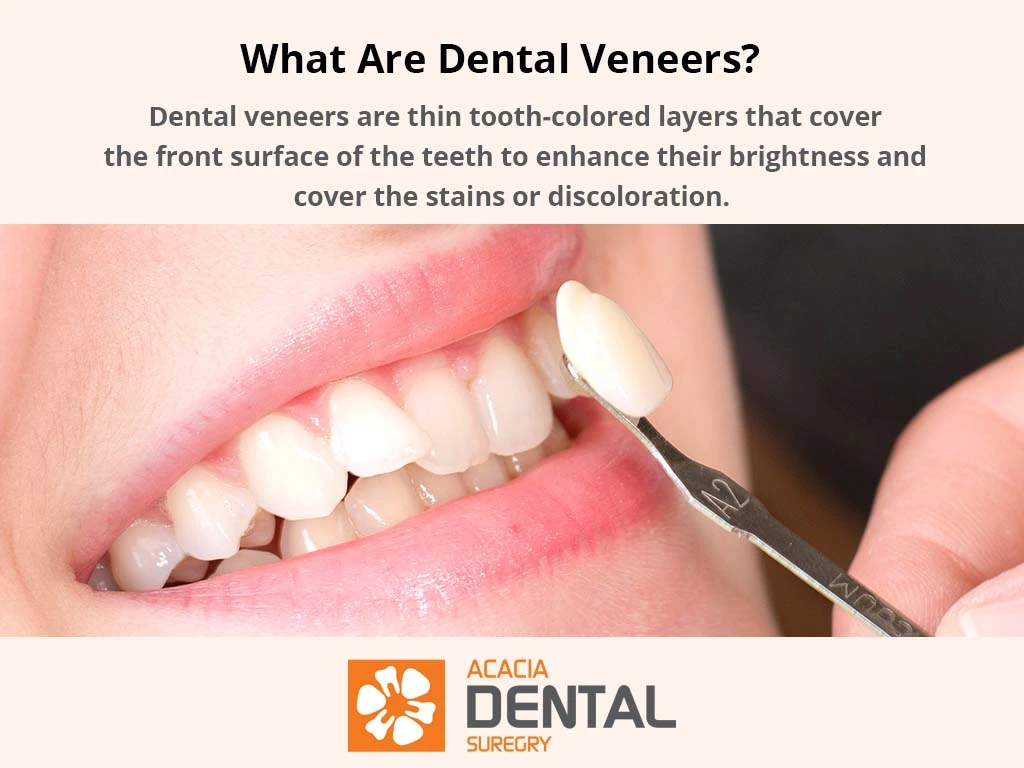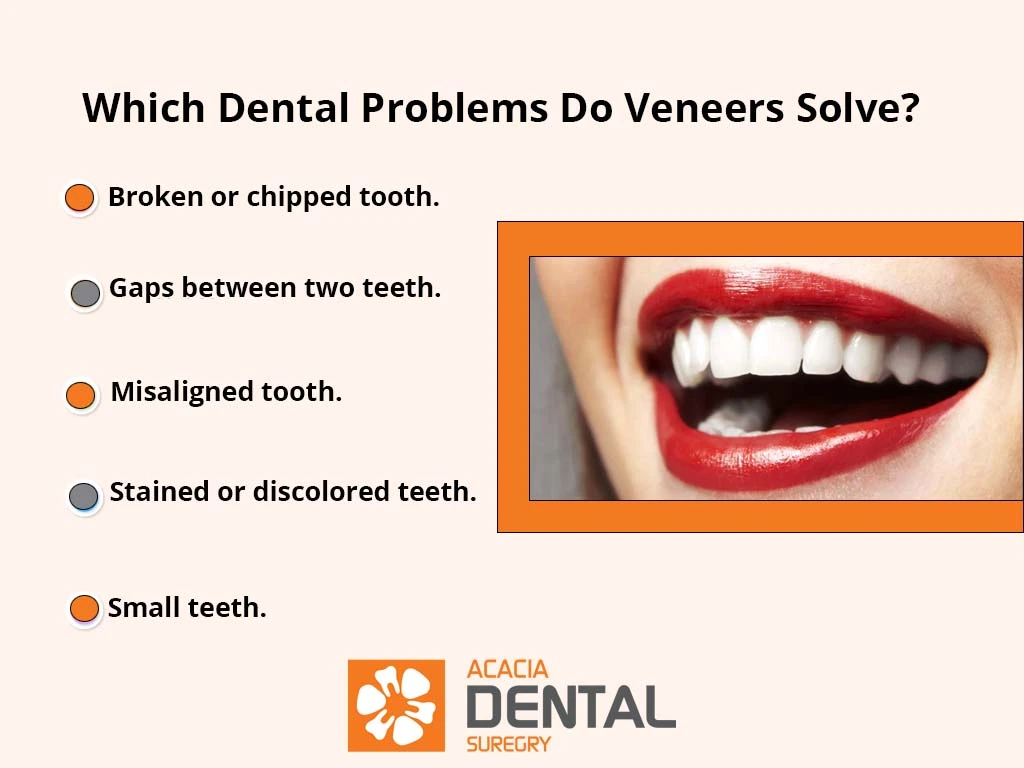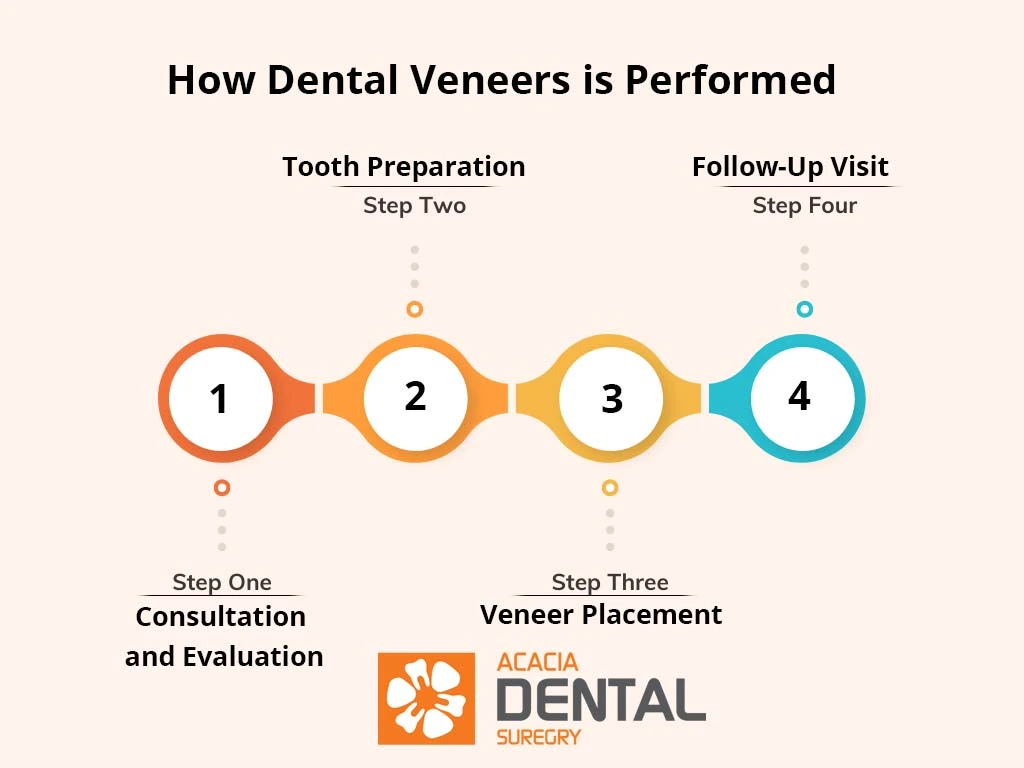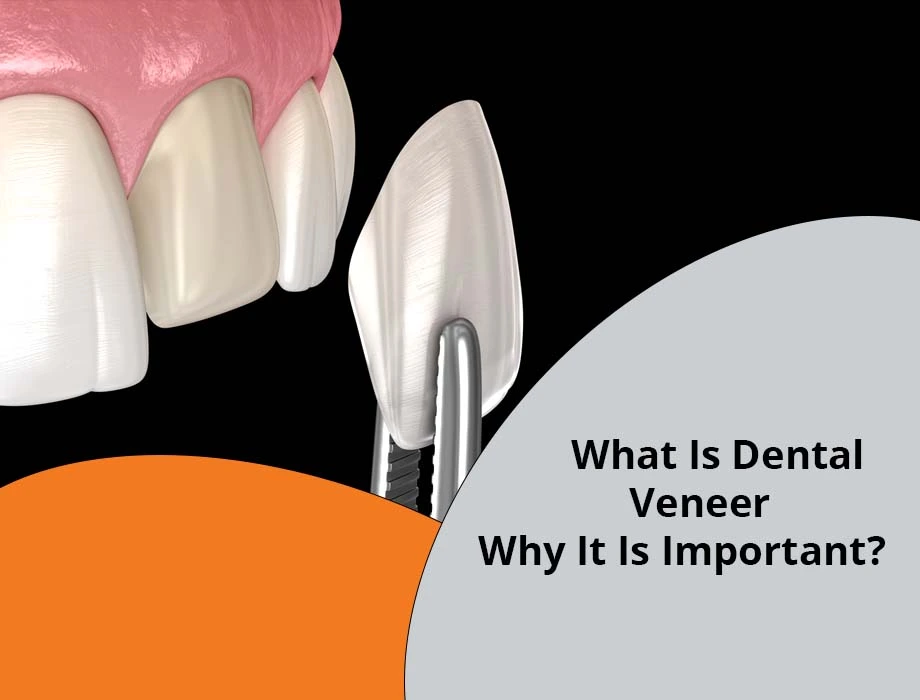Patients should have conditions that make them eligible for each cosmetic dentistry procedure. However, among all, dental veneers are something that almost everyone can undergo. Have you ever considered having veneers? Let’s see what is dental veneer and why you. should consider that.
What is Dental Veneer?
Natural teeth can become stained or discolored due to various factors, such as smoking or consuming acidic beverages. While most people can whiten their teeth with a standard procedure, stubborn stains and discoloration may require alternative treatments. Therefore, dental veneers are the most appropriate procedure.
You may wonder what is dental veneer. Is it a major dental procedure or expensive? Don’t worry; dental veneer is a very common procedure. Let’s explain it in simple words.

Generally, dental veneers are thin tooth-colored layers that cover the front surface of the teeth to enhance their brightness and cover the stains or discoloration. Veneers are just like your natural teeth; no one can recognize you have veneers. Furthermore, this procedure doesn’t require major surgery, like dental implants. Therefore, it is common and simple for everyone to do this cosmetic procedure.
What Are the Benefits of Dental Veneers?
Like any other dental procedure, veneers come with pros and cons. First, let’s see the bright side of this procedure and figure out what are the benefits of dental veneers:
- They can cover teeth imperfections, such as chips, cracks, and discolorations.
- Veneers are more stain-resistant than natural teeth.
- They are as natural as your own teeth.
- No matter which type of dental veneer you choose, they are usually durable and last up to 15 years.
- The procedure is fast and performed in one session, making it a quick method to enhance the teeth’ aesthetic.
- Dental veneer is more affordable than major dental procedures, such as dental implants. However, they are not exactly done for the same reason. For more information, read more about dental implant costs.
Does Dental Veneers Have Downsides?
As we mentioned, even the most common dental procedures can have complications or downsides. However, they might be rare, but they should be noted:
- Since during the procedure, the dentist removes a thin layer of tooth enamel, your teeth may become sensitive to cold or heat.
- If not performed well, the veneers may fall or become dislodged.
- Dental insurance may not cover this procedure due to being under the cosmetic dentistry group. However, we recommend you check it with your insurance company.
Pro Tip: Even if your insurance doesn’t cover your dental procedure, you can use payment plans like OnePay and DentiCare for a more affordable dental payment. Read more about the treatments that are covered by these plans.
Who is Eligible for Having Dental Veneers?
In general, anyone who wants to enhance the beauty of their teeth can choose veneers. However, since the veneer material is stuck to the natural teeth, your dentist should ensure that the tooth is in perfect condition and that you are free of gum disease. Additionally, the following imperfections can be resolved with dental veneer.
- Broken or chipped tooth.
- Gaps between two teeth.
- Misaligned tooth.
- Stained or discolored teeth.
- Small teeth.

Note: If you have dental problems such as tooth decay, first it should be recovered, and then any cosmetic procedure is performed.
Different Types of Dental Veneers
Before the procedure, you should choose between different types of dental veneers, which may affect the final costs of this procedure because their price differs due to the materials used. Here are the common materials used for dental veneers.
Porcelain Dental Veneers
Made from medical-grade ceramic, porcelain veneers are among the most popular types of veneer material, which is stain-resistant and looks more like natural teeth. Furthermore, the lifespan of this material is very good; it may last between 15 to 20 years. However, in case of good maintenance, it may last even longer than this period.
Composite Veneers
The other type of veneer with high popularity is composite resin veneers, which are made with tooth-colored composite resin and the same material used for tooth bonding. Since composite material is more affordable than porcelain veneers, it has great popularity among most people. However, if you don’t know if you should choose porcelain or composite resin, you should note that the composite resin material is less durable and may last up to 5 years.
No-prep Veneers
During the veneer procedure, usually a thin layer of tooth enamel is removed. But no-prep veneer is less invasive than traditional porcelain veneers. However, it doesn’t mean that there is no need for enamel removal at all. Furthermore, this type of veneer might not be applicable to all patients. Talk to your dentist to see if you are eligible for this procedure.
Removable Veneers
The removable veneer is the newest method to cover tooth imperfections. As the name indicates, this method is not permanent. It can be a quick way to enhance the beauty of your smile without going through a semi-invasive dental procedure.
How Dental Veneers is Performed
As mentioned, the dental veneer procedure is a process that involves applying thin shells of porcelain or composite resin to the front surface of your teeth to improve their appearance. The dental veneer procedure may vary depending on the type of veneer, the number of teeth involved, and the preference of the patient and the dentist. However, a general overview of the dental veneer procedure is as follows:

1-Consultation and Evaluation
The first step is to visit your dentist and discuss your expectations and goals for getting dental veneers. Your oral health will be examined to ensure veneer is the proper procedure. Then, the dentist explains the advantages and disadvantages of different types of veneers. In addition to taking X-rays and impressions, your dentist will design a treatment plan that suits your needs.
2- Tooth Preparation
The second step is to prepare your teeth for the veneers. Depending on the type of veneer, your dentist may remove a small amount of enamel to place veneers. This may require local anesthesia to numb the area and prevent pain. Following the preparation of your teeth, your dentist will take another impression and send it to a dental laboratory to fabricate veneers. This process may take several weeks, during which temporary veneers will be used to protect your teeth.
3- Veneer Placement
The third step is to place the veneers on your teeth. Your dentist will inspect the veneers for fit, color, and shape and make necessary adjustments. Your dentist will then clean, polish, and etch your teeth to create a rough surface for better bonding. Then, a special cement is applied to the veneers to attach them to your teeth. A special light will be used to harden the cement quickly. Your dentist will remove any excess adhesive, evaluate your bite, and make any final adjustments.
4- Follow-Up Visit
The final step is to revisit your dentist after a few weeks to check how your gums are responding to the veneers and how your oral hygiene is maintaining them. Your dentist may also polish or adjust the veneers if needed.
Things to Consider Before Dental Veneer Procedures
Like any other dental procedure, there are a few things you should know before a dental veneer procedure.
- Ensure your teeth are in the cleanest condition. However, if it is required, the dentist may recommend a tooth cleaning process before the procedure.
- Ask your dentist about the procedure and the type of veneer that is better for your condition.
- Check your insurance to ensure it covers the veneer procedure. Otherwise, ask your dentist if any payment plan is available.
- You should note that dental veneers are not removable. Therefore, choose a color that is close to your natural teeth to prevent the unnatural result.
- Although veneers are durable, the material may be damaged due to grinding or hard biting. Therefore, let your dentist know if you have grinding teeth.
- You should rest on the day of the procedure. Therefore, consider a day off from work or school.
Dental Veneer Aftercare
It is important to follow your dentist’s instructions for dental veneer aftercare. The healing process doesn’t take long. But it’s crucial to take care of your veneers during this period. Therefore, consider the following tips for dental veneer maintenance after surgery:
- Take over-the-counter painkillers if you feel discomfort or soreness in your teeth. Although pain is normal after a dental veneer procedure, it is still recommended to talk to your dentist if it takes longer than a few days or becomes intolerable.
- Don’t bite or chew hard food after the procedure. It is better to eat soft foods like soup for a couple of days.
- You should note that hard or sticky food may damage the veneers. It is better to avoid chewing gums or other chewy foods for two weeks to ensure the veneer is completely stuck to the teeth.
- Care your veneers like your natural teeth. Daily brushing and flossing teeth is still recommended.
- Drink plenty of water. It is always good for your oral health.
- It would be better if you avoid drinking hot coffee or tea for a few days after the procedure.
- Visit your dentist at least once a year for routine checkups.
Dental Veneers Cost
The cost of dental veneers may vary depending on several factors, such as the type of veneer, the number of teeth involved, the location of the procedure, and the expertise of the dentist. Unlike most major cosmetic procedures, a dental veneer is not considered very expensive. It may start from $400 and may exceed $2,500. Furthermore, composite veneer is the most cost-effective material for this procedure.
You should note that dental veneers might not be necessary for all teeth. You can do this procedure for only one of two teeth, which makes this procedure more affordable for most people.
Dental Veneers Alternatives
Veneers can be applied for different dental issues. However, in some cases, you may need another procedure that is less invasive or more cost-effective than dental veneers. Here are four alternatives to veneers that you can consider after consulting your dentist:

- Dental Crowns: The purpose of a dental crown is to restore the shape, size, strength, and appearance of a damaged or decayed tooth. If the tooth has cavities or requires dental fillings, the crown is usually used instead of veneers.
- Teeth Whitening: The most common method to whiten the teeth and regain its brightness is teeth whitening, which is done in one session with fluoride gel or laser.
- Dental Bonding: Similar to veneers, dental bonding is a cosmetic dental procedure that uses a tooth-colored resin material to improve the appearance and function of your teeth, which can be used to repair chips, cracks, stains, gaps, or misshapen teeth.
- Invisalign or Braces: If the patient’s teeth are so misaligned or overcrowded, the dental veneer might not be the perfect solution. In this case, Invisalign, braces, or other orthodontist treatments are required.
Bottom Line
In this article, we explained what is dental veneer. Overall, dental veneers can provide a long-lasting solution to improve the aesthetic appearance of teeth. They are a minimally invasive treatment option that can be completed in just a few visits to the dentist’s office. However, it is important to note that veneers require proper care and maintenance to ensure they last as long as possible. With proper care and maintenance, veneers can provide a beautiful and natural-looking result that can enhance confidence and self-esteem.
